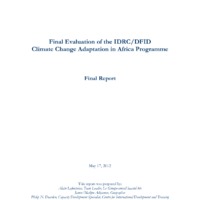Recherche
1 item
Final Evaluation of the IDRC/DFID Climate Change Adaptation in Africa Programme
A confluence of rapid increases in population, explosive growth of urban centres and largely unsustainable agricultural practices leading to land degradation is set to make Africa lag behind other regions in development in the 21st century. Among the threats to a sustainable livelihood is the threat to the global commons in the form of climate change, which, according to the United Nations Framework Convention on Climate Change (UNFCCC), refers to a change of climate attributed directly or indirectly to human activity that alters the composition of the global atmosphere and that is in addition to the natural climate variability observed over comparable time periods. Climate change will result in greater variability and more frequent extremes like droughts and floods. It is acknowledged that climate change poses a significant risk to future African generations. Adaptation to climate variability and change offers a means of assessing and responding to potential impacts, with the goal of reducing the risk of adverse outcomes and increasing resilience in responding to stress. Adaptation is described as an adjustment in natural or human systems in response to actual or expected climatic stimuli or their effects that moderates harm or exploits beneficial opportunities. Adaptation can be anticipatory or reactive, private or public, autonomous or planned. With the goal of significantly improving the capacity of African populations and organisations to adapt to climate change in ways that benefit the most vulnerable, the Climate Change Adaptation in Africa (CCAA) research and capacity development programme was launched in 2006 as a jointly funded initiative of the Canadian International Development Research Centre (IDRC) and the UK Department for International Development (DFID). A strategy was designed to strengthen the capacity of African stakeholders to contribute to adaptation to climate change, support adaptation through action research, make the findings of scientists on climate variability and change more widely available and inform policy processes with high-quality science-based knowledge. In order to achieve the outlined goals and objectives, the programme incorporated three core activity areas: Participatory Action Research (PAR), capacity development and knowledge sharing. The expectation was that at the conclusion of the programme, research teams would be better able to assess climate-related vulnerabilities and evaluate and develop adaptation options; stakeholders would be better prepared to engage in knowledge sharing; the most vulnerable groups would be better equipped to implement improved adaptation strategies; and policy makers would be in possession of up-todate knowledge necessary for mainstreaming vulnerability and adaptation issues.
